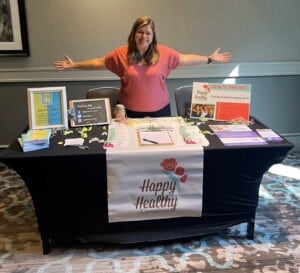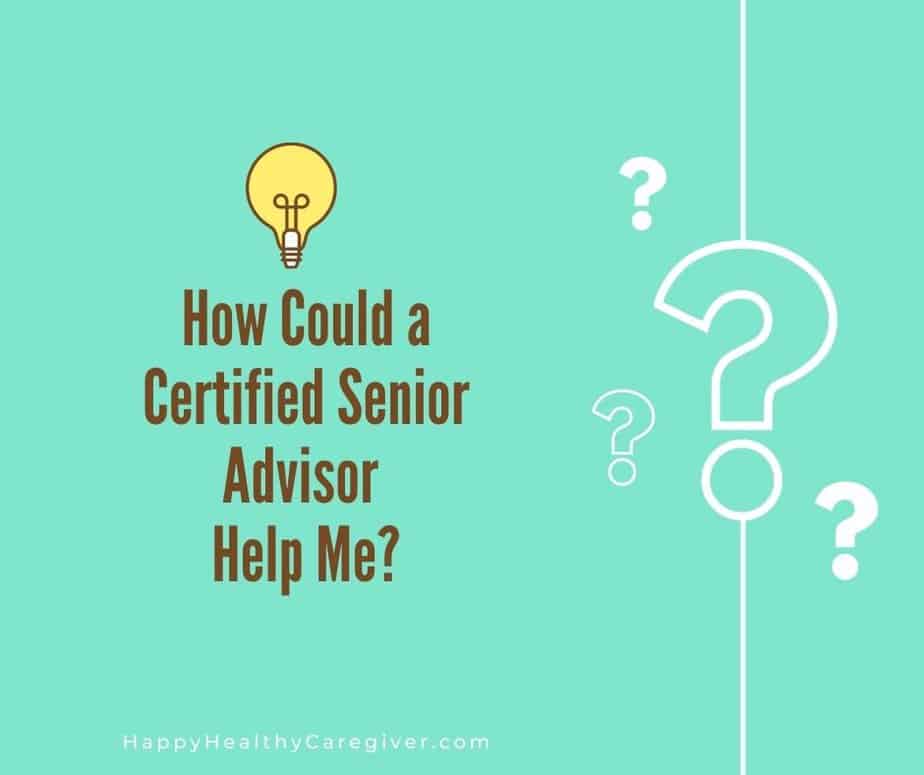[ad_1]
A considerable part of the mission of Happy Healthy Caregiver is to fast-track family caregivers to resources. Your time is limited, and the information is scattered everywhere. Then, once you find something, you question if it can be trusted.
I first became aware of Certified Senior Advisors(CSA) in 2016 when I took a virtual course to become a Certified Caregiving Consultant. I wanted to learn how to coach family caregivers (and help myself!) and start my own business to help family caregivers. One of the students was a fellow ‘carepreneur’ and former guest on the Happy Healthy Caregiver podcast – Jenn Chan. Jenn had already undergone the CSA training, and I remember asking her about it. Since then, I’ve met many other Certified Senior Advisors, mainly at Atlanta area networking groups focused on serving older adults. The certification seemed interesting to me then, but I was working full-time and barely had time to do the business activities I already had on my plate.
Becoming a Certified Senior Advisor
Not long after that, I was approached about writing an article for the CSA Journal. This academic journal is a leading professional publication in the senior market focusing on critical issues for aging adults. Writing the article for this journal was one of the most difficult pieces I have written because I had to write it with older adults in mind and provide proof for everything I was stating and knew to be true. The article is called ‘How Older Adults and Their Family Caregivers Can Integrate Daily Self Care.’ I’m proud of how it turned out.
Last summer, the CSA annual conference was held in Atlanta. The sponsorship opportunities were affordable, so I decided to be the level of a sponsor that included event registration and a vendor table to share the Happy Healthy Caregiver resources. I met many professionals from all over who work with seniors. Some of their professions included elder law, senior living placement, financial planners, real estate agents, adult community owners, insurance agents, and so many others. What was rare at the event where folks who provided coaching and support services to family caregivers.
Like many settings I find myself in, people first assume I provide home care services. I frequently explain that I know the family caregivers are doing a fantastic job caring for their loved ones; my focus is helping them care for themselves. During the event, I wondered if adding CSA to my educational expertise would be beneficial, and I even asked some conference attendees about it. What kept me from going all in was the money involved in the training and wondering if there would be a return on my investment. Since becoming a full-time entrepreneur in 2021, I had to be even more diligent with what I was spending my money on. The conference closing ceremony happened, and guess who won the grand scholarship prize for the Society of Certified Senior Advisor’s Working with Older Adults course? Me! I saw this as a divine sign and was grateful that I received the opportunity.

I waited until after the holidays to take the course since this is my slowest season for speaking events and a quieter time for family events. In February, I completed the online course and did all the required self-studying. Then, in March, I passed the proctored exam, and I became a CSA – a Certified Senior Advisor. Immediately after was our trip to Jamaica for my sister’s 50th birthday, and I felt like this vacation was well-earned!
Who are the CSAs?
The Certified Senior Advisor certification program started over 20 years ago and is administered by the Society of Certified Senior Advisors.
CSAs are committed to helping seniors and their families navigate the challenges and complexities of aging. They provide a valuable resource for individuals seeking guidance and support as they age. By working with a CSA, older adults and their families can access a wealth of information, resources, and services to help them maintain their independence, protect their assets, and ensure their health and well-being.
Certified Senior Advisors (CSAs) have undergone specialized training through an accredited program to assist seniors and their families with various aspects of aging, including healthcare, finance, legal issues, and social and emotional concerns. CSAs come from multiple backgrounds, including healthcare, financial planning, social work, and legal services.
To become a CSA, individuals must complete a rigorous training program and pass a certification exam. The training covers a broad range of topics related to aging, including healthcare, financial planning, housing, and legal and ethical issues. CSAs must complete ongoing education to maintain their certification and stay up-to-date with the latest developments in aging.
There are three steps to earning the CSA certification: Candidates must pass the CSA exam and complete the CSA’s Role, Rules, and Responsibilities Ethics Module. The third step is passing a required background check. The designation process is complete once a candidate has passed the exam, completed the Ethics Module, and passed the background check.
Accreditation is an Important Differentiator
You may have skimmed over it, but above, I mentioned that this certification is ‘accredited.’ When people claim to be ‘certified,’ a critical follow-up question is to ask if the certification is accredited. Here’s why:
An accredited certification is a certification program that has undergone a rigorous review by an independent accrediting body and has been found to meet specific standards. Accreditation assures quality and credibility for the certification program and enhances the value of the certification for those who hold it.
Verify if a certification program is accredited and recognized by a reputable accrediting body, such as the National Commission for Certifying Agencies (NCCA) or the American National Standards Institute (ANSI). These organizations are respected as industry leaders in certification program accreditation. Here is a directory lookup to see if a certification is accredited.

What Can a CSA offer a family caregiver?
A CSA (Certified Senior Advisor) can assist family caregivers in several ways, including:
- Assessing Care Needs: A CSA can help family caregivers assess the care needs of their loved ones. They can provide information on the types of care available, the costs of care, and the various resources available to help with caregiving.
- Providing Resources: CSAs can offer a wide range of resources to family caregivers, including information on local support groups, respite care programs, and legal and financial resources.
- Care Coordination: A CSA can help family caregivers coordinate care for their loved ones, including scheduling appointments, coordinating transportation, and arranging in-home care services.
- Education and Training: CSAs can provide education and training to family caregivers on how to care for their loved ones. This can include information on medication management, wound care, Medicare services, estate planning, etc.
- Advocacy: A CSA can advocate for family caregivers. They can help families navigate the healthcare system and ensure their loved ones receive the care and services they need.
Mainly when I was new to caregiving, I felt like my head would explode with all the information I needed. Acronyms, complicated systems, and conflicting opinions confused me. I could have significantly benefited from the knowledge of a CSA.
Signing up for the free Senior Spirit Newsletter will help familiarize you with the older adult resources terminology. The newsletter publishes monthly and targets professionals who work with seniors. However, I can see where it would be helpful for their caregivers, too!
There are also some free downloads on the CSA website. Such as: Understanding Veterans Benefits, a Resource for Seniors, and Protecting Seniors Against Identity Theft, Scams, and Elder Abuse.
Where Do I Find a Certified Senior Advisor near me?
The Society of Certified Senior Advisors offers an online member lookup. Even before becoming a CSA, I frequently visited this resource. Since I coach family caregivers all over the US, I often look to connect them with a local resource. I feel more comfortable referring someone to a CSA because they have worked to become one.
The CSA Locator is open to the public, so enter your state and city to explore what comes up! Be sure to scroll through the pages to see what is available. The search overview will share a photo, if available, email address, phone number, city, and primary industry. Click ‘view profile’ to view the details.
Even if a chosen CSA cannot help you with your particular need, they are a great place to start for local referrals.
[ad_2]
Source_link


